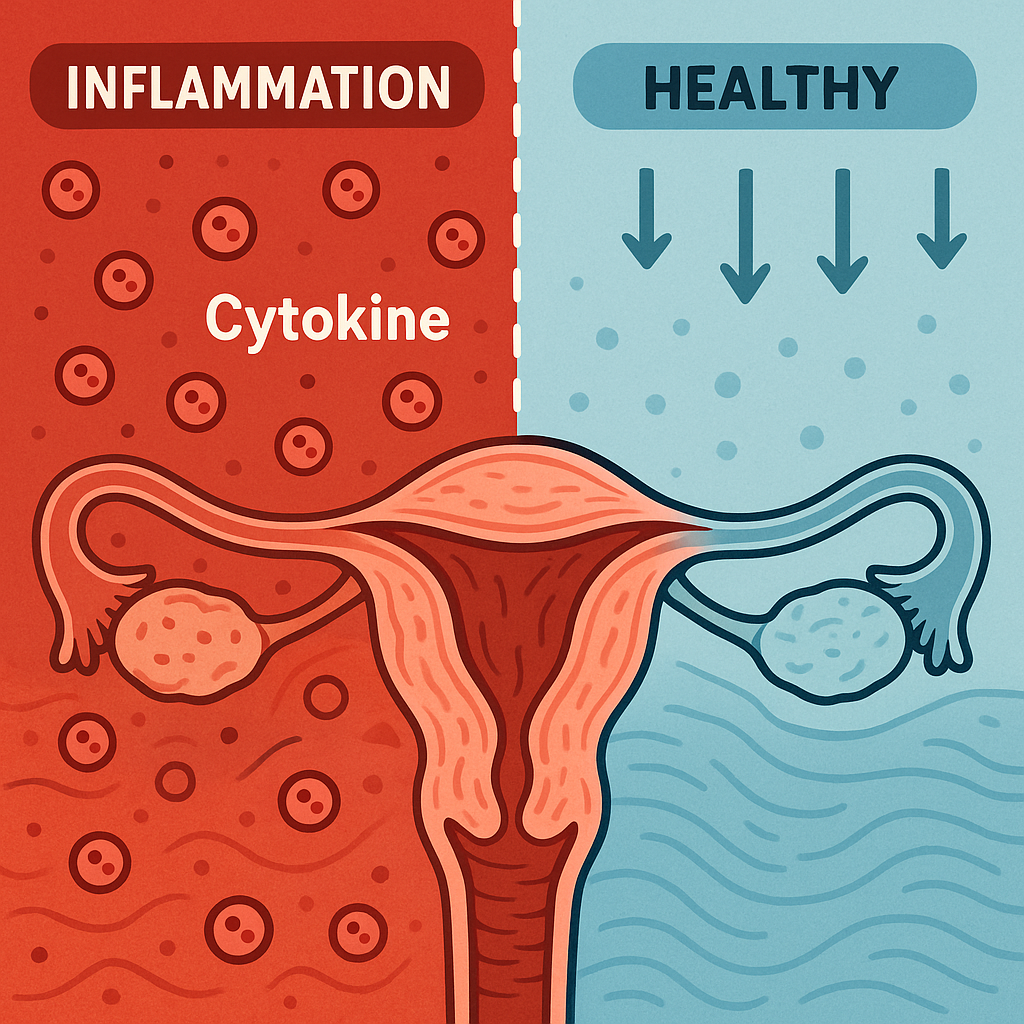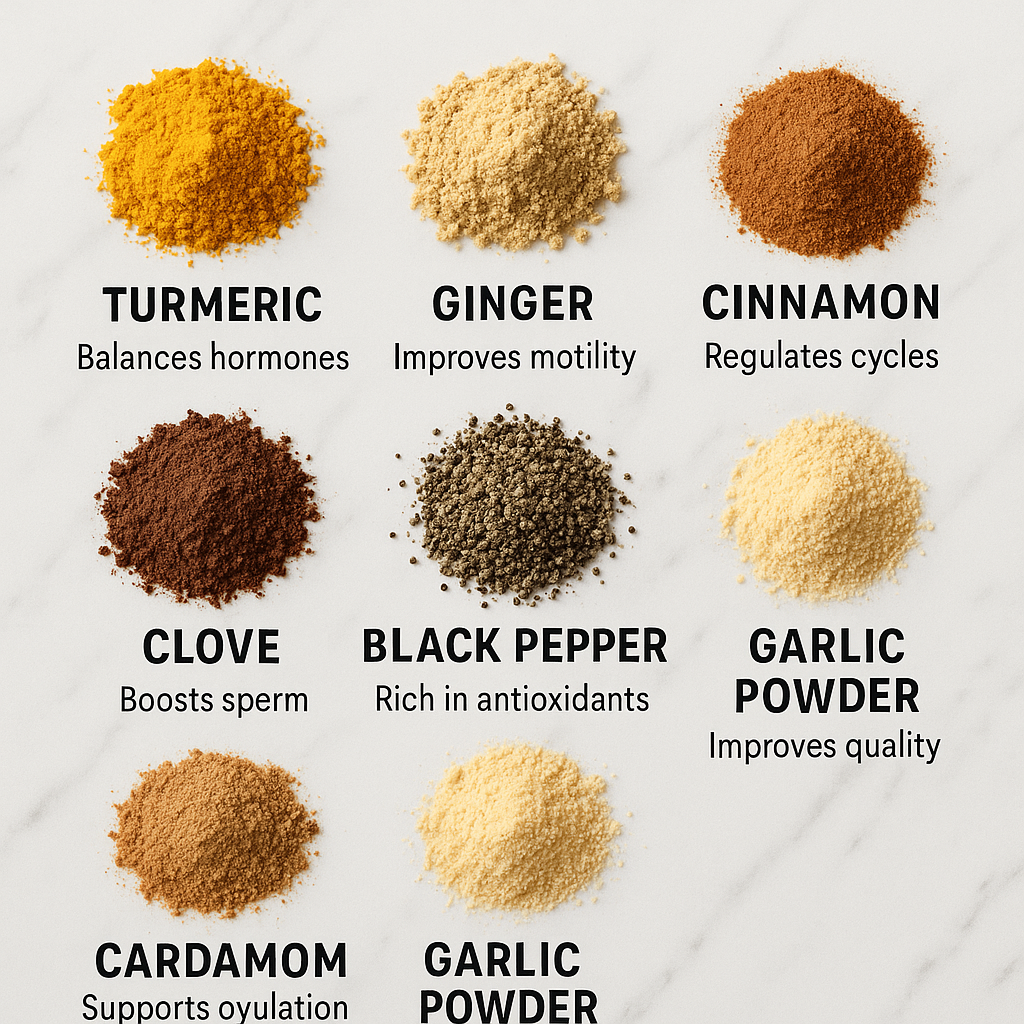You are not alone in your concerns about inflammation and fertility. Infertility affects millions of individuals and couples in the United States, often causing emotional and financial stress. Research shows that chronic inflammation can disrupt reproductive health, leading to irregular cycles, implantation issues, and reduced sperm quality. Addressing inflammation is a practical step you can take to support your fertility journey.
Diet plays a powerful role in managing inflammation. Certain spices like ginger, cinnamon, turmeric, black pepper, clove, and others are rich in bioactive compounds that help reduce inflammation in the body. These spices have been shown to lower inflammatory markers and support hormonal balance, which are both crucial for reproductive health. Integrating these “power spices” into your meals is a simple, natural way to take charge of your well-being and fertility.
You deserve compassionate, evidence-based guidance. By making informed choices about what you eat, you can actively support your body’s natural ability to heal and conceive. Small changes, like adding these spices to your daily routine, may help you move closer to your fertility goals.
- How does inflammation actually lower your chances of conceiving?
- Why are spices mini anti-inflammatory pharmacies?
- Which seven power spices cut inflammation and raise fertility?
- How can you work these spices into a daily TTC plate without overthinking it?
- What dosage, safety, and preparation tips should you know before sprinkling?
- Your top spice-and-fertility questions, answered
- Final Thoughts
- References
How does inflammation actually lower your chances of conceiving?
Inflammation can significantly lower your chances of conceiving by disrupting key reproductive processes in both women and men. In females, chronic inflammation impairs the quality of eggs (oocytes), interferes with the development of ovarian follicles, and disrupts hormone production. This can lead to irregular menstrual cycles, poor egg maturation, and reduced embryo implantation rates. In males, inflammation in the reproductive tract increases levels of harmful molecules called pro-inflammatory cytokines and reactive oxygen species, which damage sperm DNA, reduce sperm count, and impair sperm motility.
Key ways inflammation affects fertility include:
- Egg (Oocyte) Quality and Maturation: Chronic inflammation in the ovaries impairs the development and maturation of eggs, making them less likely to be fertilized or develop into healthy embryos. This is often seen in conditions like obesity and polycystic ovary syndrome (PCOS), where inflammatory molecules and oxidative stress damage the eggs.
- Hormone Disruption: Inflammation interferes with the production and regulation of reproductive hormones such as estrogen, progesterone, and testosterone. This can lead to irregular menstrual cycles, poor ovulation, and reduced sperm production.
- Endometrial Receptivity: The uterine lining (endometrium) must be receptive for an embryo to implant. Inflammation alters the immune environment and cytokine balance in the uterus, making it less likely for an embryo to successfully implant and grow.
- Sperm Damage: In men, inflammation in the reproductive tract increases levels of pro-inflammatory cytokines and reactive oxygen species, which damage sperm DNA, reduce sperm count, and impair motility. This leads to lower fertilization rates and higher miscarriage risk.
- Anatomical Changes and Scarring: Chronic inflammation from infections or conditions like endometriosis can cause scarring and blockages in the fallopian tubes or reproductive tract, physically preventing sperm and egg from meeting.
- Immune System Imbalance: Persistent inflammation can trigger immune responses that mistakenly attack reproductive tissues or sperm, further reducing fertility.
According to a 2025 review in Reproduction, “Chronic inflammation has a negative impact on oocyte quality, folliculogenesis, hormone production, immune signaling, and other processes that affect fertility in females”. The Centers for Disease Control and Prevention (CDC) also notes that conditions like pelvic inflammatory disease, often driven by inflammation, account for up to 1 in 8 cases of infertility in women in the United States. Addressing inflammation is a crucial step in protecting and improving your reproductive health.
For a whole-diet approach, see our cycle-synced meal plan.

Why are spices mini anti-inflammatory pharmacies?
Spices act as mini anti-inflammatory pharmacies because they contain powerful natural compounds that target the same pathways as many pharmaceutical drugs. These bioactive ingredients, such as curcumin in turmeric, gingerol in ginger, capsaicin in chili peppers, and eugenol in cloves block the production of inflammatory molecules in your body, including cytokines and enzymes like cyclooxygenase (COX) and lipoxygenase (LOX). By inhibiting these pathways, spices help reduce swelling, pain, and tissue damage, much like nonsteroidal anti-inflammatory drugs (NSAIDs), but with fewer side effects.
Spices also:
- Lower levels of inflammatory markers such as tumor necrosis factor-alpha (TNF-α), interleukin-1 beta (IL-1β), and interleukin-6 (IL-6).
- Interfere with the activation of nuclear factor kappa B (NF-κB), a key driver of chronic inflammation.
- Provide antioxidants that neutralize harmful free radicals, further protecting your cells from inflammation-related damage.
As Dr. K. Srinivasan, a leading spice researcher, explains: “A diet rich in specific anti-inflammatory spices may reduce inflammation and exert a preventive effect on inflammation-related diseases”. These natural compounds work together, making your spice rack a practical, accessible tool for supporting your body’s fight against inflammation. meal-timing tips.
Which seven power spices cut inflammation and raise fertility?
Seven power spices that cut inflammation and raise fertility include ginger, cinnamon, turmeric, black pepper, clove, fenugreek, and garlic. Each of these spices contains unique bioactive compounds that target inflammation and support reproductive health.
Below are the seven stars, their headline compound, and quick fertility wins.
| Spice | Key Compound | What the studies show | Easy kitchen tip |
|---|---|---|---|
| Turmeric | Curcumin | 8-week trials cut IL-6 by 50 %; lowers CRP; supports luteal hormone balance | Whisk ½ tsp into soups or golden milk—always add a crack of pepper and a drizzle of olive oil |
| Ginger | Gingerol | RCTs ease menstrual pain and oxidative stress; meta-analysis shows 22 % boost in sperm motility | Grate 1 tsp into stir-fries or steep as tea |
| Cinnamon | Cinnamaldehyde | Six-month study in PCOS women restored regular cycles and improved insulin sensitivity | Stir ¾ tsp into oatmeal or smoothies |
| Clove | Eugenol | Highest antioxidant of common spices; supports gut bacteria that metabolize estrogen | Add a pinch of ground clove to lentil or chili recipes |
| Black Pepper | Piperine | Independent anti-inflammatory; magnifies curcumin uptake | Finish dishes with freshly ground pepper instead of salt overload |
| Cardamom | Terpinyl acetate & vitamin C | Animal data show higher follicle count and reduced ovarian oxidative stress | Toss ¼ tsp into coffee, chai, or yogurt |
| Garlic | Allicin | Improves blood flow, immune modulation, and endothelial function—key for implantation | Crush 1 fresh clove into dressings or roasted veggies |
These spices work together to lower inflammatory markers, balance hormones, and protect reproductive cells, making them valuable additions to your diet if you are seeking to improve fertility and overall reproductive health.

How can you work these spices into a daily TTC plate without overthinking it?
Small, steady doses beat heroic weekend binges. Aim to weave two or more power spices into each meal:
Breakfast – Cinnamon-blueberry steel-cut oats pair fiber with blood-sugar-steadying spice. Find more ideas in our low-sugar breakfasts.
Lunch on-the-go – Ginger-garlic quinoa salad travels well and features in our quick TTC lunch boxes.
Snack – A turmeric-cardamom smoothie adapts to your cycle stage; grab exact ratios in phase-based smoothies.
Dinner – Clove-pepper spiced lentil stew marries plant protein with two inflammation fighters. Unsure on amounts? Our simple portion guide keeps serving sizes straightforward.
What dosage, safety, and preparation tips should you know before sprinkling?
Culinary use is safe for most healthy adults. Stay under these daily ceilings unless a clinician advises otherwise:
• Turmeric: 4 g (≈2 tsp)
• Cinnamon (Ceylon preferred): 6 g (≈2 tsp)
• Ginger: 4 g fresh or 2 g dried
• Garlic: 3 raw cloves or 1 g powder
Pregnancy & meds: Turmeric and garlic thin blood; large Cassia-type cinnamon contains liver-irritating coumarin. If you’re on anticoagulants, prepping for surgery, or newly pregnant, talk with your provider first.
Preparation science:
– Heat plus fat unlocks curcumin.
– Raw ginger keeps gingerol potent; cooking shifts it toward milder shogaols.
– Crushing garlic, then resting it 10 minutes, maximizes allicin.
Quality counts: Buy organic, non-irradiated spices and store in dark glass to protect delicate polyphenols.
Your top spice-and-fertility questions, answered
Does my partner benefit, too?
Yes—spices like turmeric, ginger, garlic, and fenugreek can improve male fertility by boosting sperm count, motility, testosterone levels, and reducing oxidative stress and inflammation.
How long until I might notice cycle changes?
Improvements in menstrual regularity or fertility markers may be seen within 1–3 months of consistent spice use, though individual results vary and longer use may be needed for full benefits.
Should I choose supplements or whole spices?
Whole spices are generally safer and provide a range of beneficial compounds, while supplements can offer higher, targeted doses but may carry more risk of side effects or interactions. For most people, culinary use is recommended unless a healthcare provider suggests otherwise.
Are there risks to using spices daily?
Spices are safe in typical food amounts, but high doses (especially as supplements) can cause digestive upset or interact with medications. Pregnant individuals and those with health conditions should consult a doctor before increasing intake.
Which spices are best for fertility?
Ginger, turmeric, fenugreek, garlic, cinnamon, black pepper, and clove are among the most studied for their anti-inflammatory and fertility-boosting effects in both men and women.
Final Thoughts
Power spices like turmeric, ginger, cinnamon, garlic, and others offer a natural, accessible way to reduce inflammation and support fertility for both men and women. Their bioactive compounds such as curcumin in turmeric and gingerols in ginger work by lowering oxidative stress, balancing hormones, and improving reproductive health markers like sperm quality and menstrual regularity. Clinical evidence shows that these spices can help manage conditions like PCOS and male infertility, making them valuable additions to a fertility-focused diet. Incorporating these spices into daily meals is safe for most people when used in typical culinary amounts, and they fit well within anti-inflammatory dietary patterns like the Mediterranean diet, which is linked to better fertility outcomes. While supplements are available, whole spices in food are generally preferred for safety and broader health benefits.
Consistency is key; regular, moderate use over several weeks or months may yield noticeable improvements. Always consult a healthcare provider if you have underlying health conditions or are considering high-dose supplements. Ultimately, these power spices offer a simple, flavorful, and evidence-backed way to support reproductive health and overall well-being.
References
-
The effect of chronic inflammation on female fertility. Reproduction (Cambridge, England), 169. https://doi.org/10.1530/REP-24-0197
-
Exploring the interplay between inflammation and male fertility… The FEBS journal. https://doi.org/10.1111/febs.17366
-
Immunoregulation and male reproductive function: Impacts and mechanistic insights into inflammation… Andrology. https://doi.org/10.1111/andr.13772
-
Anti-Inflammatory Influences of Culinary Spices and Their Bioactives. Food Reviews International, 38, 1 - 17. https://doi.org/10.1080/87559129.2020.1839761
-
Male Fertility and Aphrodisiac Potential of African Culinary Spices: Exploring the Evidence. Tropical Journal of Natural Product Research. https://doi.org/10.26538/tjnpr/v9i4.61
-
Anti-Inflammatory Diets in Fertility: An Evidence Review. Nutrients, 14. https://doi.org/10.3390/nu14193914
-
Exploring the Antioxidative Effects of Ginger and Cinnamon: A Comprehensive Review of Evidence and Molecular Mechanisms Involved in Polycystic Ovary Syndrome (PCOS) and Other Oxidative Stress-Related Disorders. Antioxidants, 13. https://doi.org/10.3390/antiox13040392
-
A Comparative study on the effects of Yaji (Suya Meat sauce) and its spice constituents on the male reproductive profile of adult male Sprague Dawley rats. JBRA Assisted Reproduction, 25, 509 - 523. https://doi.org/10.5935/1518-0557.20210020